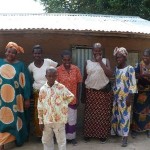God Likes Family Planning
Tanya is currently interning with SFCG in the DRC.
By Tanya Castle
In Congo the average family has 6.4 children. The average income is less than $100 per month. With so many mouths to feed children are often left to fend for themselves at a very early age and more often than not bear the burden of providing for their younger siblings as well. These children are robbed of their childhood and their rights.
Very few children are able to attend school, which ultimately perpetuates the cycle of poverty. And even those who do have a chance to study will likely not find work. The population growth rate far exceeds the economic growth rate in Congo and much of sub-Saharan Africa. More than half of youth are unemployed or severely underemployed—a recipe for conflict.
It puzzled me why these parents have so many children when they simply can’t appropriately support their growth—food, clothes, appropriate shelter, school fees etc.
I have since heard one reason.
While buying credit for my cell phone at a corner shop, a woman probably in her mid-thirties asked me for a job. She explained that she was unemployed, had been for years, and had six children. I couldn’t help myself and said: “well if you have no job and can’t feed your children why do you have so many and why do you want more?”
She looked at me perplexed by the question. This is not a question that is posed in Congo. But before she could respond the saleswoman, of around the same age, chimed in.
“Each child is a gift from God.”
Before thinking, I abruptly said: “you know what I think is a gift from God—family planning!”
Realizing the shock I had caused these women raised in a very conservative religious society, I quickly paid for my airtime and left.
What I said was a little harsh and insensitive thinking about it now. But I’m sorry, children don’t have a choice in regards to the circumstances they are born, but parents do. In Congo it is time parents started exercising this choice in a responsible way.










I had the same conversation with a woman on a plane from Rwanda to Addis Ababa
This is a problem that really needs to be addressed if the DRC is to prosper in the future.
Although the task of re-education is a huge one. It could take at least 2 generations before the concept of family planning is whole heartedly embraced.
Very true Nathan, about the timeline for new methods to be adopted. What do you think could help early adoption of family planning?
Education Education Education…… at all age levels !
In fact its bigger than that ! but education is the foundation to build on.
It also relies on a change in culture. As you know better than me in Congolese culture machismo plays a huge part. Men are Men, If a guy wants to have sex and does not have a condom it’s unlikely they would pop down the shops in the heat of the moment, that’s if they could find somewhere that sold condoms. (I agree this is an issue also faced in all other cultures)
Maybe government incentives for smaller families? Free education for the first child but this opens a can of worms in regards to subsequent children possibly missing out on an education
Thoughts?
Hi Nathan,
Thanks for the cmment. I would agree that education plays a huge role, as do gender roles and culture. The government must run a campaign on the benefits of family planning if there is going to be any change. It is an uphill battle but definitely not impossible.